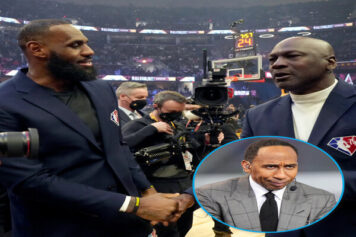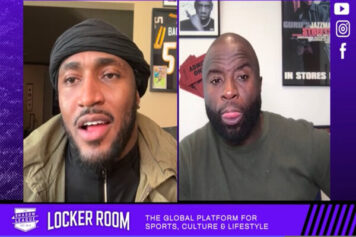2019 was shaping up to be the year of Rich Paul.
The rising star in the world of athlete representation already had LeBron James on his roster, helping him make moves to build a Black power foundation in LA. Then he turned his attention to Anthony Davis, helping orchestrate a trade for AD to join LeBron on the Lakers this summer. He didn’t stop there.
Paul helped Ben Simmons and Draymond Greene secure the big contracts they had been looking for, giving him a roster most agents would kill for. To top it all off, two weeks ago Paul signed a deal with United Talent Agency to lead their new sports division while still maintaining significant control of his own agency, Klutch Sports.
“We’ve been looking for the right sports opportunity for quite a while,” said Jeremy Zimmer, UTA’s chief executive. “We have taken a significant stake in Klutch, but Rich retains very substantial controls because we want it to be his business and we love what he’s doing.”
Things were going great for Paul, but being a powerful Black man in the sports world brings attention and envy. The old power base gets nervous and they begin to formulate ways to circumvent that success and reel in the rising power. It’s a classic formula that has always come into play, no matter the level.
Or simply watch “Finding Forrester”, for it’s the exact situation faced by Jamal Wallace.
The quiet, secretly brilliant Black teenager from the Bronx is a star basketball player whose talents extend further than basketball. His antagonist at his new, elite New York private high school, Professor Crawford, fears his intelligence more than his basketball prowess, so he constantly talks down to him and tries to embarrass the young genius at every opportunity.
It’s an old adage used by traditionally white power structures. They set up the rules to benefit themselves, and let in those who they feel will abide by those rules. And when those same people learn how to apply the rules towards their own success, those in power change the rules, but maintain the condescending rhetoric often used.
“Given your previous education and your background, I’m sure you’ll forgive me for coming to some of my own conclusions.
“The next assignment is due in two weeks. I’ll schedule some time for you to come to my office. I’d like to have you write it there.” said Crawford to Jamal, instituting a change that only Jamal had to endure and follow. It’s Crawford’s blatant attempt to intimidate a young Black student by removing his comfort zone and resources in order to unnerve a young man who’s trying to assimilate into his new school’s environment.
In this case, Professor Crawford is the powerful NCAA, and they came into the paint strong against young Jamal, now played by Rich Paul.
“The Rich Paul Rule”
On Tuesday, the NCAA announced new qualifications and requirements for sports agents, one that many (most) viewed as a direct shot at Rich Paul.
Sources: The NCAA has officially added criteria for agents who wish to represent student athletes testing the waters for the NBA Draft.
Criteria:
– Bachelor's Degree
– Certified with NBPA for a minimum of three years
– Take an in-person exam at the NCAA Office in Indianapolis— Jon Rothstein (@JonRothstein) August 6, 2019
Many, LeBron included, called this move the “Rich Paul Rule”, and it spread like wildfire.
🤣🤣🤣🤣🤣🤣🤣🤣🤣🤣🤣 Can’t Stop, Won’t Stop! They BIG MAD 😡 and Scared 😱. Nothing will stop this movement and culture over here. Sorry! Not sorry. 😁✌🏾
— LeBron James (@KingJames) August 6, 2019
According to ESPN, agents must fill out an application, go through a background check and agree to cooperate with the NCAA in relation to rule violation investigations, “even if the alleged violations are unrelated to [their] NCAA-agent certification.”
“Men’s basketball student-athletes who are considering careers in professional basketball but who may want to return to school are only permitted to accept permissible agent services from NCAA-certified agents with a signed agent agreement,” stated the memo from the NCAA obtained by ESPN. “It is important to remember that a men’s basketball student-athlete cannot enter into an agent agreement until after his team’s season has concluded, and the student-athlete has requested an evaluation from the NBA undergrad advisory committee.”
Per ESPN: “Agents who complete the application and background check will take the in-person exam on Nov. 6, the day after the college basketball season begins with the Champions Classic in New York City.
Agents who meet every requirement besides the three-year NBPA certification can receive an exception if the student-athlete they represented this past spring decided to return to school.”
Paul never received a college degree, which is one of the reasons why many are dubbing the rule after him. Like Jamal, his background is being used against him by the powers that be, and they’re taking full advantage of their position to make abrupt change.
The NCAA stated that they’re trying to protect their student-athletes with these stipulations. Actually, the NCAA stated that they’re trying to “protect the collegiate eligibility of their athlete clients.”
Athlete clients? Interesting. Now that they’re clients, the rules have suddenly changed for those like Paul, aka Jamal.
https://twitter.com/Sam_Vecenie/status/1158820610220232704?ref_src=twsrc%5Etfw%7Ctwcamp%5Etweetembed%7Ctwterm%5E1158820610220232704&ref_url=https%3A%2F%2Fwww.cbssports.com%2Fcollege-basketball%2Fnews%2Fncaa-raises-bar-for-criteria-of-agents-representing-players-who-want-to-test-waters-of-nba-draft%2F
Rich Paul Is Jamal Wallace
The changes, which went into effect this month, would exclude Rich Paul, and others, despite being certified by the National Basketball Players Association (NBPA). Paul could be frozen out of the recruitment process for the NCAA’s client athletes.
But Paul might have some options to fight against the NCAA, one of which is to sue the organization, claiming that the criteria violates federal antitrust law.
While there are many arguments for both sides to employ (you can check them out at Sports Illustrated), the fact remains that the first shot in this fight was fired by the NCAA, and its primary target appears to be a young Black man who is flexing his muscles in an area traditionally reserved for white agents.
Like “Finding Forrester”, where Jamal’s writing brilliance is thwarted at every chance by a disgruntled author turned professor, Paul must now play by a new set of rules constructed, allegedly, to limit his success.
“You think if one of his two comma kids was writing these papers he’d be doing this ‘considering your background’ s**t?”
“Crawford can’t understand how a black kid from the Bronx can write like you do,” said William Forrester, a surrogate father figure to Jamal, shortly after his infuriating and embarrassing discussion in Crawford’s classroom.
But like Jamal being stereotyped because he’s a Black kid from the Bronx, Paul has faced his doubters as he’s a Black kid from Cleveland.
“The biggest challenge is being a young black man.” said Paul.” There’s also the challenge of the naysayers who say, “He hasn’t done this” or “He can’t negotiate that”. That’s a part of the business. So you can either do one of two things. You can buy into that or you can continue to push. And that was my thing.”
The similarities between the two Black men are obvious, and their situations remain the same as race and performance are intertwined in everyday life once again. Jamal the character is in a movie, yet he’s realistic in every sense, and we see his story unfold in the life story of Rich Paul.
Like Jamal, Paul is too accomplished to remain content with the success he’s achieved so far and too smart to remain limited by these new rules, so expect him to orchestrate a brilliant maneuver, like Jamal writing his final paper, “Losing Family”, and dismiss the new obstacles he’s presented with by the NCAA.
Jamal Wallace got his in the end, and we expect Rich Paul to do the exact same.



